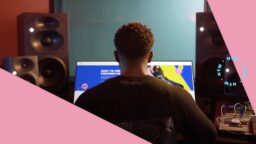The following MBW blog comes from Jakub Kaczmarek, a Director of A&R and International Development at Universal Music Group. Kaczmarek (pictured inset), who is based in Warsaw, Poland, has worked in A&R at UMG for over four years.

This year will be a difficult follow-up to what hit us in early 2020.
No matter how well we’ve adjusted to new circumstances, we can’t expect artists to feel normal. That is why we should act as empathetically as we can.
As the live music industry has died (temporarily), the only way for artists to connect with their audiences has been to actually to record new music and be active on social media.
We all remember the early stage of COVID-19 when everyone began to stream live gigs from their living rooms, garages, bathrooms, and so on. The motivation for artists and their listeners to connect and support each other was at the highest level. That was good for a month or three.
Some of our artists are struggling to barely survive. Others have the privilege of making a living from copyrights, savings, or music sales. Both groups, though, are frustrated.”
Today, nearly a year on, we’re still unable to attend festivals or club shows. (Maybe apart from short moments when concerts at 25% or 50% capacity were allowed by certain administrations.)
So what now? Some of our artists are struggling to survive. No shows = no live income. Others have the privilege of making a living from copyrights, savings, or music sales.
Both groups of artists, though, are frustrated. And as the A&Rs, we need to support them more than ever before.
What can we do:
- Be closer with your artists
- Listen to them even more carefully
- Ask questions
- Offer your help
- Keep them highly motivated and productive
- Call or text them that bit more
- Provide tools to aid their development
Empathy is a word that we all know well. It’s an experience that we learn as young kids and stays within us forever. We can recognize two or even three various types of empathy: affective empathy; cognitive empathy; and
sort of a mixture of both called compassionate empathy.
Affective empathy is when we mirror in ourselves what another person feels. It’s also called emotional empathy.
Cognitive empathy is when you put yourself into someone’s shoes. It’s based on rational thinking, not emotions.
What our artists need today is compassionate support. Not only to understand them but also to feel their emotions. Naturally, there has to be a balance of both, probably in different measures for each individual. Make sure to lead them through these hard time – if they need such support, of course.
“Empathy builds an environment of openness. This reduces misunderstandings and conflicts.”
Being empathetic will help also us to know our artists better, understand them well, and as a result, achieve bigger goals together. You will discover a meaningful purpose for your daily duties, way richer than creating fantastic music.
Empathy builds an environment of openness. This reduces misunderstandings and conflicts. It’s worth mentioning that it also helps prevent burnout, or at least slows it down, which is a big threat from this year.
To summarize, remember to take the perspective of your artist more often, try to feel their emotions, hold out a helping hand – and don’t limit this behavior only to matters of them delivering their music.Music Business Worldwide





